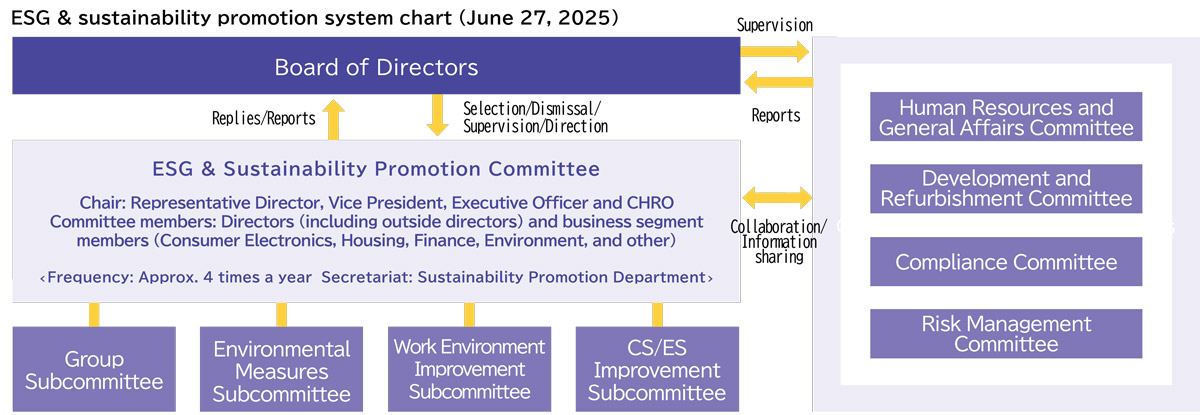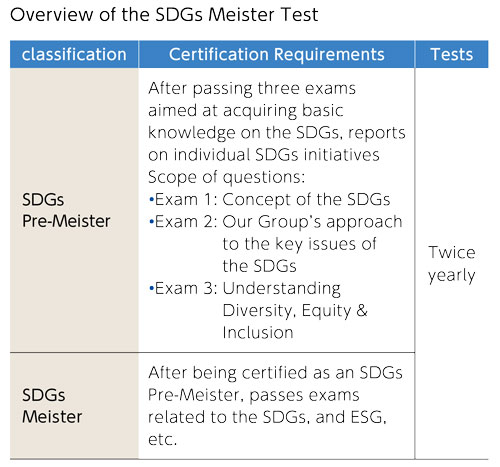With the aim of being a corporate group that continues to grow with society, the YAMADA HOLDINGS Group is promoting sustainability activities based on appreciation and trust with respect to its stakeholders in accordance with its specific action guideline, the Code of CSR Ethics. In order for the Group to continue to be a company that contributes to solving social issues and improves corporate value, it recognizes that consideration of environmental, social, and governance (ESG) factors is essential. By actively working both inside and outside the company, the Group will contribute to the realization of a sustainable society. In addition, we recognize the importance of sustainability challenges and engage in business activities to address them in order to fulfill our mission of “Total-Living.” Our Group identifies and evaluates sustainability-related risks and opportunities to prioritize key issues, integrating them into our business activities while aiming to establish sustainability management.
The YAMADA HOLDINGS Group has established the ESG & Sustainability Promotion Committee, with the Representative Director, Vice President, Executive Officer and CHRO as Chair, as a place to deliberate policies and measures on environmental and social issues and to confirm the progress of its targets. The committee makes decisions on all the important matters related to ESG and sustainability.
In addition, the four subcommittees under the Committee, namely the Group Subcommittee, the Environmental Measures Subcommittee, the Work Environment Improvement Subcommittee, and the CS/ ES Improvement Subcommittee, discuss the content of individual activities and confirm targets and progress of ongoing activities. Furthermore, a system for coordinating and sharing information has been established with each of the Human Resources and General Affairs Committee, the Development and Refurbishment Committee, the Compliance Committee, and the Risk Management Committee.

At YAMADA HOLDINGS Group, we recognize the importance of sustainability challenges and engage in business activities to address them in order to fulfill our mission of “Total-Living.” Our Group identifies and evaluates sustainability-related risks and opportunities to prioritize key issues, integrating them into our business activities while aiming to establish sustainability management. To help create a sustainable society through business as a Group, YAMADA HOLDINGS has formulated, and is working toward, goals linked to the Group's materiality.
The YAMADA HOLDINGS Group recognizes that sustainability-related risks are serious risks to the sustainability of its business. Therefore, sustainability-related risks are incorporated into the companywide risk management framework, and the Risk Management Committee regularly reviews and evaluates these risks and opportunities to identify those that require priority attention. For high-priority risks, measures are considered by each subcommittee, implemented by relevant departments, and monitored to manage the risks effectively.
The YAMADA HOLDINGS Group sets targets for each of its materiality, and regularly monitors the progress of all metrics at the ESG & Sustainability Promotion Committee.
The YAMADA HOLDINGS Group regularly conducts training on sustainability to promote activities across all companies in the Group. In FY2025 and in continuation from the previous year, videos about the sustainability issues that employees should be concerned about in their daily work and how to address these issues were shared to all employees, including those at Group companies, on the Group’s dedicated learning site, My Learning.
We have also established the SDGs Meister System, an internal certification system, as an educational system to help the Group face its material issues, and as of March 31, 2025, there were 932 certified employees in the program.

The YAMADA HOLDINGS Group is working to increase corporate value by building relationships of mutual appreciation and trust through a healthy dialogue with all its various stakeholders, including its customers, all its shareholders and investors, all its suppliers and business partners, and its employees and local communities.
| Stakeholder | Responsibility to fulfill | Targets to achieve | Means of dialogue |
|---|---|---|---|
| Customers | The YAMADA HOLDINGS Group is promoting a customer-first approach in its business operations. The Group strives to continuously improve services through customer feedback and employee training so that we can achieve customer satisfaction throughout the organization. |
Development of services to support our customers’ “Total-Living”
Optimal product proposals
High customer service and proposal skills
|
Customer service at all Group stores
Customer help desk
Customer questionnaires (Store manager direct survey)
Information on the website
All types of social media
|
| Shareholders and investors | The YAMADA HOLDINGS Group aims to maintain sustainable growth and increase corporate value in order to meet the trust and expectations of its shareholders. The Group also makes efforts to ensure active communication by disclosing information in an appropriate, timely, and fair manner. |
Constructive dialogue
Timely and accurate disclosure
Reflecting the opinions of shareholders in management
Transparent disclosure
|
General Meeting of Shareholders
Integrated report
〈 For domestic investors and analysts 〉
Quarterly briefings
Financial results brifings
Individual visits
Investor meetings (including online)
Monthly preliminary report
〈 For overseas institutional investors 〉
Investor meetings (including online)
Participation in conferences for overseas institutional investors
|
| Suppliers and business partners | The YAMADA HOLDINGS Group strives to maintain a sound, fair, and equitable relationship with its manufacturers and other business partners, aiming for coexistence and co-prosperity based on a long-term relationship of trust. |
Fair and equitable trading
Achieving a sustainable supply chain
Building sound partnerships
|
Business partner questionnaire surveys
Shoeikai
(Dialogue with business partners) Business talks and training for delivery and installation companies
|
| Employees | The YAMADA HOLDINGS Group believes that people are the most important element of its operations. As such the Group provides a system that enables employees to feel satisfied in their work and promotes fair and proper performance appraisals. At the same time, the Group is working to develop employee skills and improve the working environment. |
Human resource development
Comfortable working environment
Diversity, Equity & Inclusion
Health and safety at work
Fair and impartial evaluations
|
Training and seminars
System to propose improvements
Internal whistleblowing desk
Health and Safety Committee
Engagement survey
Career-Up Sheet, a system for talking directly with the human resources director
In-house intranet
Company newsletter “Harmony”
Labor-management consultations
|
| Local communities | The YAMADA HOLDINGS Group has a close relationship with many local communities through its nationwide store network, and it can say that the local community is the very foundation of the Group. As a good corporate citizen, the YAMADA HOLDINGS Group strives to live in harmony with said local communities and deepen its relationship of trust. |
Building trust
Solving social issues through the nationwide network of stores
|
Regional revitalization efforts
Donations and fundraising activities
Volunteering
Athletics classes
Yamada Noboru Memorial Foundation activities
Reuse and recycling plant tours
|
| Government and administrative authorities | The YAMADA HOLDINGS Group maintains appropriate relationships with the government, relevant ministries and agencies, and local government, to facilitate the running of its business. |
Compliance with laws and regulations
Proposals to industry associations and government policy
|
Exchange of information with the Japan Major Consumer Electronics Appliance Distributor Association and the SEIDANREN (The federation of industry for national life and consumer’s association)
Tax office (putting up blue tax return posters)
Police station
(attending traffic safety meetings, helping to prevent bank transfer fraud, etc.) Ministry of Economy, Trade and Industry, and Ministry of Finance (various surveys)
|